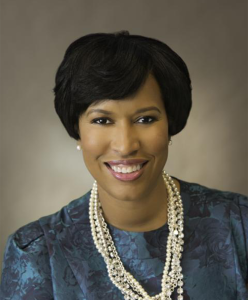
Mayor Muriel Bowser (D) has expressed dissatisfaction with D.C.’s paid family leave bill, which the D.C. Council passed Dec. 20, due to concern about the way it is funded and the payroll tax raise for District employers.
Passing by a vote of nine to four on Dec. 20, the Washington, D.C. Council approved a new payroll tax to fund an expansive family and medical leave benefits plan for the city’s private sector employees.
If the bill is signed by Mayor Muriel Bowser (D), it moves to Congress for review.
The Universal Paid Leave Amendment Act of 2016 ensures paid leave of eight weeks to parents of newborns, six weeks to workers tending to an ill relative and two paid weeks in sick time.
The council’s approval of the bill imposes a new 0.62 percent payroll tax on all District employers. The tax is expected to create $250 million annually, which will be allocated by the mayor’s office.
Councilmembers David Grosso (I-At Large) and Elissa Silverman (I-At Large) co-sponsored the bill. Grosso said he expects the bill to help the entire community, regardless of concerns from across the aisle. Grosso also said the bill’s passage marks a major success for the District’s progressive lawmakers.
“I think it’s going to be beneficial mostly for the entire city,” Grosso said in an interview with The Hoya. “This is a challenge, but I think people will come to realize that when workers get to come home to care for their loved ones, it’s better for business, it’s better for the workers and ultimately it’s better for the entire community.”
D.C. Council Chairman Phil Mendelson (D), who championed the bill, explained its significance at a council meeting in November.
“This bill will be the most generous in the nation by providing eight weeks paid leave for family care such as a sick child or parent, and 11 weeks paid parental leave such as for bonding with a newborn child,” Mendelson said.
The benefits established by the bill do not extend to federal and District employees as the city cannot tax federal workers and city workers already benefit from a paid leave program. According to a statement from Mendelson’s office, the payroll tax will go into effect in January 2019, and the benefits will be available in January 2020.
Bowser took issue with an earlier version of the bill and claimed she would not sign it into law. However, after the bill went through amendments including reducing the amount of leave time from 16 weeks to 14 weeks, Bowser said she would consider it.
Bowser’s office did not respond to a request for comment as of 2:30 a.m.
Grosso said he believes Bowser disputed the original version because of the way it was funded.
“She didn’t like the way we were paying for this legislation, and frankly she didn’t come up with a great alternative,” Grosso said of Bowser’s initial reaction. “I am convinced that she and the others who have disagreed with this approach agree that it’s important to give paid leave.”
However, Grosso said the bill could ultimately help small businesses as well, creating a healthier workforce in the long term.
“It will also have a benefit to the businesses directly,” Grosso said. “They will have a stronger workforce. They will have a broader base to recruit from for their workers. And they won’t have to train somebody when somebody has to go out for a couple days to care for someone.”
Many business leaders in the District have stated opposition to the bill, stating they previously offered various forms of family and sick leave to their employees, but object to the tax increase that comes with this bill.
Greater Washington Board of Trade President and CEO Jim Dinegar said the board is not opposed to paid family and medical leave, but they have concerns over its funding.
“We worked hard to develop a workable, affordable and appropriate paid family leave approach,” Dinegar said. “We have been vocal proponents of paid leave and represent countless businesses that provide even more leave than called for in this legislation, which is why we were disappointed to be charged a tax to provide benefits our members already provide, often at far better levels.”
However, Mendelson expressed his belief that the bill will bring workers to D.C.
“Most businesses see benefits as a means to attract and retain workers. Looked at from this perspective, the bill makes the District a more attractive place for workers, and therefore becomes a benefit to District employers,” Mendelson said.




















